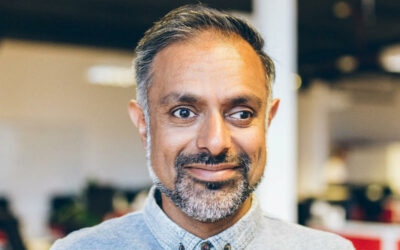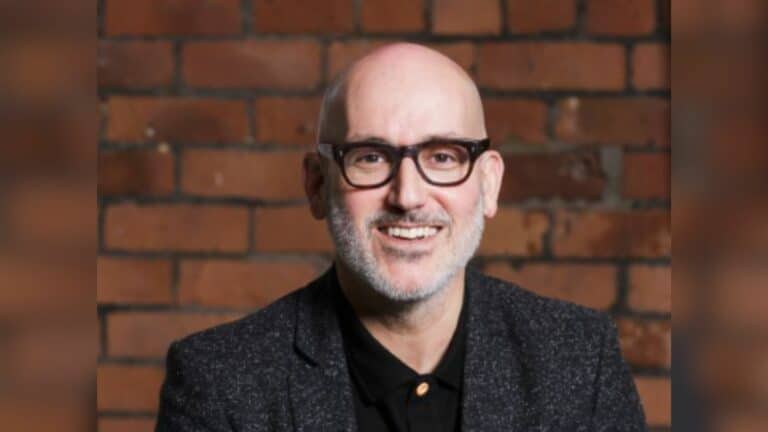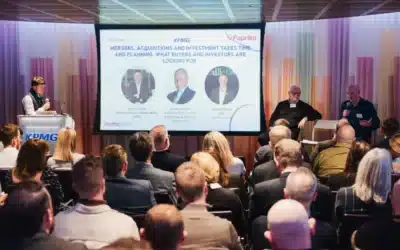Justin Young is CEO at ecommerce agency Bring Digital, which was acquired by Dark Matter Commerce last year.
Originally from South Africa, Young has over 25 years experience working in online retail – both agency and in-house – and now lives in Cheshire with his family.
The agency hired more than 13 new staff to service its growing client base at the end of 2023.
Whether it’s his lucky breaks, best failures or even an appearance on Baywatch, he shares all the lessons he’s learnt across his career and personal life.
Which single daily habit or practice could you not do without?
I’ve always been an early riser. Each morning, I get up before 6am, and before I do anything else in the day, I look at our clients’ performance. I’ve been doing that since day one of joining Bring Digital five years ago: it’s become an essential part of my routine. Reviewing performance before the working day begins allows me to spot important opportunities and risks without getting distracted. It keeps me on track. It means I can focus on the big picture when issues crop up in the various meetings I might have throughout the day. It’s a game-changer!
What’s been your luckiest break?
My luckiest break has been my friendship with Steve Thompson, founder of Forward Role. Without Steve, I would never have met David Ingram, who originally founded Bring Digital. That chance meeting set me on an incredible journey that takes me to where we are today: one of the UK’s most respected ecommerce consultancies.
Steve, David and I have learned so much from one another. For me, that’s the sign of a great friendship, and it’s those friendships from which your lucky breaks most often come!
What’s your best failure?
I’m a big cricket fan. I get some funny looks from my English friends and family when I cheer on South Africa (my home team), but for me, cricket is personal. I played a lot of cricket when I was younger, and I was quite good, too: as a kid, I made it to the Under 11’s cricket final. That was a big deal for me.
But then something happened that I’ll never forget: I dropped a crucial catch. We went on to lose the game.
For a period of time, that was a very painful memory. But the disappointment of losing pushed me to work harder to win. For weeks and months afterwards, I practised incredibly hard to make sure I didn’t make the same mistake; I didn’t want to feel that disappointment again
Reflecting on it now, I realise how important that failure was in defining my work ethic today. Over time, I learned that no matter how hard you work, people will drop the ball now and again. But what matters is whether you can pick yourself up again and keep playing. The game’s not over yet!
P.S. Go Proteas!
What is the best investment you’ve ever made, either financial or time?
I’ve made a lot of great investments in my career, but I’d say the best I ever made wasn’t a business decision at all. My wife and my daughter are both a little horse-obsessed. I’ll be honest: it’s not my thing. But as my daughter got older and showed an increasing passion for them, I eventually crumbled, and we started keeping horses.
I’ve got to say: it’s one of the best decisions I’ve made. Seeing the joy it brings the both of them is hugely rewarding for me; it makes the hard work worth it. Although it would be easier if they were happy with a hamster or something!
Which podcast or book would you recommend others to read and why?
One of the podcasts I’ve listened to the most is Freakonomics Radio. There are a lot of great episodes but I’d specifically recommend one from 2017 called “How to Get More Grit in Your Life”. That episode features an interview with psychologist Angela Duckworth, who argues that a person’s ability to stick at something, despite the setbacks, gives them a much greater chance of success than talent alone.
Angela’s research resonated with me because I’ve seen so much evidence of that myself. The most successful people I’ve known have been the ones who were willing to stick with something even when it wasn’t going their way.
Funnily enough, Angela also has a book on the subject called Grit. There you go: a podcast and a book recommendation!
What one piece of advice would you give your 21-year-old self?
“Be more patient.”
I’ve always been very competitive. I played a lot of sports because it’s in my nature to want to win. But when I was younger, that drive to succeed meant I felt I always needed to act — and act fast.
The thing is: life isn’t like sports. As I’ve grown older, I’ve learned that sometimes the best decision you can make is to wait.
Looking back, I think I sometimes took it personally when someone didn’t want to act quickly like I did. Now, of course, I can see that those people were exercising patience. That’s something I had to learn over time.
I’m still just as driven to succeed as I was in my twenties. The difference now is that I know how to channel it: I can stand back, look at the whole picture, and determine which decisions need time to breathe.
Who or what has had the single biggest influence on your working life?
There are a lot of influential people I have in my life. Two of my biggest influences — indeed, my role models — are my father-in-law and my uncle always. They always believed in me. They always backed me when I wanted to do something bold. You know the people you can count on by what they do when the chips are down, and they always bet on me, whether I was soaring or struggling.
But perhaps the biggest influence on my working life was my decision to move to the UK. I was 25 and determined to make a name for myself. Moving to a different country, into a different culture with different expectations, taught me how to build something — even an entirely new life — from the ground up. That’s been instrumental in my career up to now.
Tell us something about you that would surprise people.
I was an extra on Baywatch.
It was the early nineties. I was in the US doing a thesis in my final year. I happened to be at Venice Beach and they were looking for extras. I put myself forward… and the rest is history!
I can’t remember which episode specifically, but I’m pretty sure it’s in season three. If you watch carefully, you’ll see me in the background of one of the beach shots. It might take you a second to recognise me though: I had hair back then!
If there was one thing you could change about your career, what would it be and why?
This might be a cop-out answer… but if I’m really honest, I don’t know if I would change anything about my career. I don’t really have regrets because I believe every experience you have in your life — be it success or setback — is an opportunity to grow.
Sure, there are decisions I’ve made that could have gone better. But would I have learned what I did if I hadn’t made those mistakes? Probably not. It helps you build up your resilience, which you’ll need, because things don’t get easier as you get older: if anything, it’s the opposite.
What does success look like to you?
I think anyone who is growing is succeeding. Everything is always moving forward, so if you’re standing still, you’re going backwards. There are a lot of people who look successful from the outside, but inside, they’re stagnant, and in a few years, they’ll be struggling.
Surround yourself with positive people who have aspirations to grow, and you’ll grow too. Embrace and relish the challenges life throws at you: easily won games are rarely fun!














